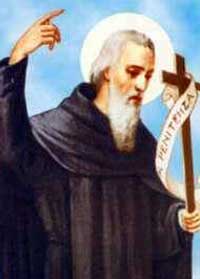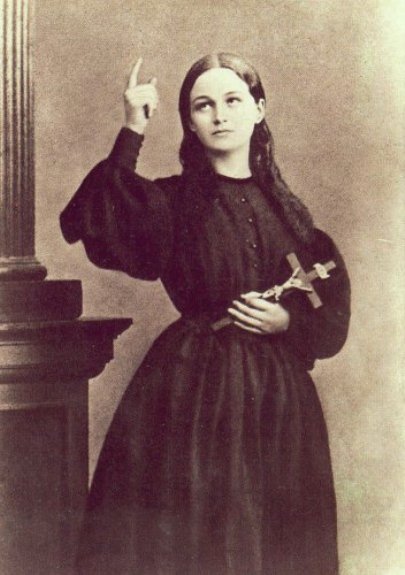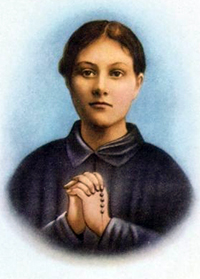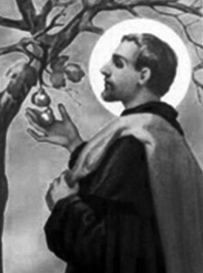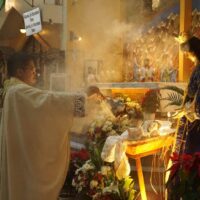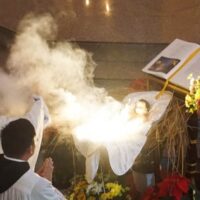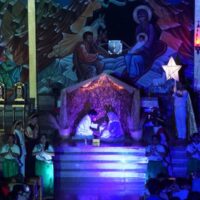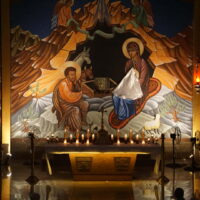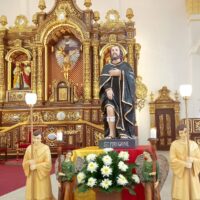 Joachim was born about 1258 in Siena, Italy. At the age of thirteen he was received into the Servite Order by Saint Philip Benizi. He lived in the communities of Siena and Arezzo and there he gave an admirable example of devotio to the Blessed Virgin Mary, humility and charity.
Joachim was born about 1258 in Siena, Italy. At the age of thirteen he was received into the Servite Order by Saint Philip Benizi. He lived in the communities of Siena and Arezzo and there he gave an admirable example of devotio to the Blessed Virgin Mary, humility and charity.
He loved others so much that when he was unable to console an epileptic with words he asked for and obtained from God that he might take the sickness upon himself. He died in 1305. In 1609 Pope Paul V permitted the Servite Order to celebrate Mass and Divine office in his honor.
From the Life of Blessed Joachim of Siena (Nn. 1-6, 17-19 passim; Monumenta OSM, V, pp. 7-9, 11-12) I bear the sufferings of Christ in my body.
Joachim was born in the city of Siena; both of his parents were of noble blood. While still a child at school, he cultivated a special devotion to the holy Mother of God. His devotion was so great that what ever he could secretly take from home he distributed in her name to those who asked him for her sake. From the very beginning this stripling of God revealed his goodness, a youth of perfect character that gave clear signs of his love for the honor of the glorious Virgin above all things; he appeared to all already a saint, and looking into the future they said, “If this child lives, he will be a great saint!”
When the devout boy reached the age of fourteen, he saw the Blessed Virgin in a dream, surrounded by choirs of angels and doted in a splendid robe. She said to him, “Sweetest son, come to me; I know how much you love me, therefore I choose you for my service forever.” When the holy youth awoke, he was inspired by this vision of Our Lady and made up his mind to enter the Order of Servants of Saint Mary the Virgin.
At that time the illustrious confessor Philip, who was general of the Order, was in the priory at Siena. Re was a brilliant light and a father of truly great holiness. Philip received him into the Order and asked by what name he wished to be called. The boy, burning with devotion to the Virgin, asked to be called Joachim. By bearing her father’s name, he might always be dose to her in mind and body. In the world he had been called Chiaramonte.
Once in the Order, Joachim, the servant of God, gave himself completely to a life of great humility. In spite of his noble origins and youth, he preferred the humblest and most distasteful tasks. He comforted the suffering, served the sick, and with his own hands carried out with devotion those vile services which were repugnant to others.
He loved obedience especially and called it the food of the soul, in the words of the Savior: My food is to do the will 0/ my Father who is in heaven. Blessed Philip later sent him to the priory in Arezzo. When he had been there about a year, he and Fra Acquisto of Arezzo, a man of great fame, were passing through the countryside. It was night and rain was falling hard, so they took refuge in an inn. They found there a sick man who had been suffering for a long time. Blessed Joachim heard his lament with compassion and said to him, “Brother, have patience; this illness will be your salvation.” But the sick man replied, “Good friar, it is easier to praise infirmity than to bear it.” Joachim then said, “I beseech almighty God to free you from this illness and give it to me, his servant. May death alone release me from this infirmity. So shall 1 bear continually the suffering of Christ in my body.” The sick man got up from his bed forthwith; he was completely healed. The friar remained in his place, a victim of epilepsy. This sickness afflicted him for the rest of his life and through it he won a crown of martyrdom
It pleased the Most High to adorn him with yet another crown. Another illness struck him: the flesh was eaten away to the bone in some parts of his body and worms appeared. He hid it from the friars as long as he could, but when they learned of it they were very saddened. They entreated him to pray for himself, that he be freed from this affliction. He replied, “Beloved brothers, it is not fitting for me to do so, because this ailment is to purge my sins and strengthen my soul; as the Apostle said, When I am weak, then am I strong.”
The Lord revealed to him that his death was near, and he begged God to call him on the same day the Savior left the world. On the eve of his departure from earth, the day of the Lord’s Supper, he spoke to the assembled friars: “Beloved brothers, I have lived with you thirty-three years, the length of Our Lord’s life on earth. 1 have received many services from you, I and you have assisted me in my every need. I am not capable of thanking you sufficiently for all you have done. May the Lord Jesus Christ thank you and repay you for what you for what you have done for me. Tomorrow 1 shall leave you, and I pray you to entreat the Lord to receive me, a sinner, into his dwelling. I desire to renew our fraternal love before departing.” He then drank a little wine with them.
But on Good Friday, just before the Passion was sung, he sent for the prior and said to him, “Reverend Father, in a little while the Lord will call me from this earth. Call the friars to my bedside and give me the sacraments of the Church, even though 1 received the Sacred Body with all of you yesterday. 1 don’t want to leave you while all alone.” The prior was not entirely convinced, but he couldn’t ignore his words either, so he left four friars with him. Joachim continued praying while the Passion of the Lord was being sung. At the words, “inclinato capite, emisit spiritum” (he bowed his head and yielded up his spirit), he raised his eyes and, while the four friars stood around, gave his spirit back to the Creator.
Prayer
God our Father, you taught Joachim, disciple of Jesus and Mary, to serve his brothers and sisters even by accepting their sickness. May we learn from his example to acknowledge our own weakness and so be compassionate and understanding of the weakness of others. We ask this through our Lord Jesus Christ.
 Diocese of Parañaque
Diocese of Parañaque

